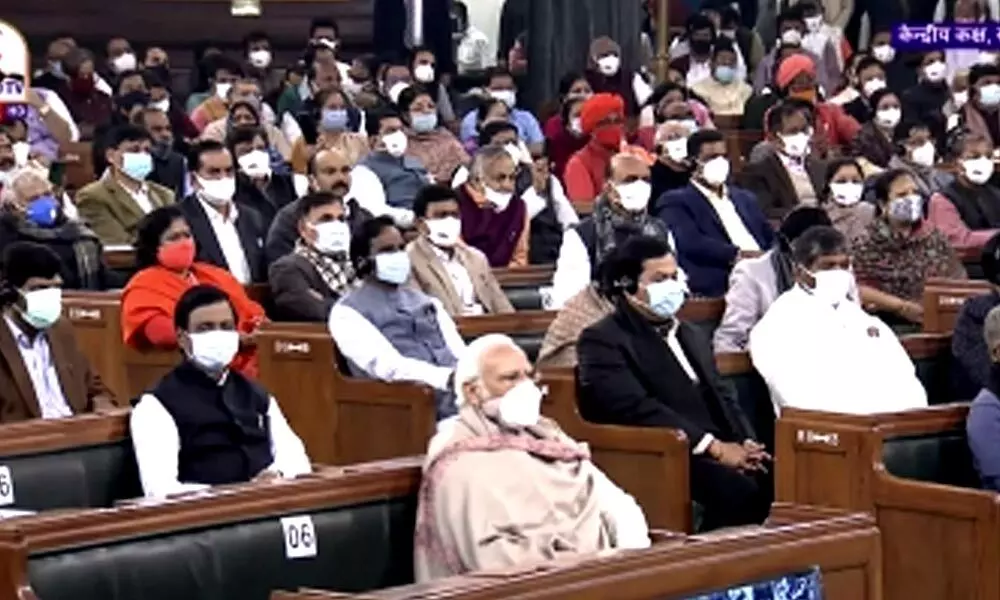Live
- Tribal leader Vaba Yogi nominated as DVMC member
- Ola Electric expands network
- NRI deposits soar $11.9 bn in 7 mths
- Positive outlook on FDI inflows in 2025
- EY forecasts 6.5% GDP growth for FY25
- Chicco opens new store
- DPIIT-recognised startups over 1.57 lakh
- Gunfight between armed groups in Imphal village
- Road blockade in Pak: 100 kids die awaiting aid
- Will develop constituency in every aspect: Bojju Patel
Just In
Atmanirbhar Bharat isn't protectionism but a pragmatic recognition of vagaries of int'l supply-chains


Atmanirbhar Bharat isn't protectionism but a pragmatic recognition of vagaries of int'l supply-chains (Photo/IANS)
While some commentators have likened the Atmanirbhar Bharat approach to a return to old school protectionism, far from it, the focus on economic resilience is a pragmatic recognition of the vagaries of international supply-chains, the Economic Survey tabled in Parliament said on Monday.
New Delhi: While some commentators have likened the Atmanirbhar Bharat approach to a return to old school protectionism, far from it, the focus on economic resilience is a pragmatic recognition of the vagaries of international supply-chains, the Economic Survey tabled in Parliament said on Monday.
The Survey has noted that a distinguishing feature of India's economic response has been an emphasis on supply-side reforms rather than a total reliance on demand management.
These supply-side reforms include deregulation of numerous sectors, simplification of processes, removal of legacy issues like 'retrospective tax', privatisation, production-linked incentives.
Even the sharp increase in capital spending by the Government can be seen as both demand and supply response as it creates infrastructure capacity for future growth.
The emphasis given to the supply-side in India's Covid-19 response is driven by two important considerations. First, Indian policy-makers saw the disruptions caused by travel restrictions, lockdowns and supply-chain breakdowns as an interruption of the economy's supply-side. Although this also squeezed demand, it is not correct to see the pandemic related economic slowdown as just a demand problem as happens with most economic cycles.
Second, the post-Covid world will be impacted by a wide variety of factors -- changes in technology, consumer behaviour, geo-politics, supply-chains, climate change and so on. All of these factors will also interact in unpredictable ways with each other. Therefore, the post-Covid economy will not be merely a re-inflation of the pre-Covid economy. Simply building it back with demand measures is not a solution, theSurvey noted.
There are two common themes in India's supply-side strategy. Reforms that improve flexibility and innovation in order to deal with the long-term unpredictability of the post-Covid world. This includes factor market reforms; deregulation of sectors like space, drones, geo spatial mapping, trade finance factoring; process reforms like those in government procurement and in telecommunications sector; removal of legacy issues like retrospective tax; privatisation and monetization, creation of physical infrastructure.
Reforms aimed at improving the resilience of the Indian economy. These range from climate/environment related policies; social infrastructure such as public provision of tap water, toilets, basic housing, insurance for the poor, and so on; support for key industries under Atmanirbhar Bharat; a strong emphasis on reciprocity in foreign trade agreements, and so on. Some commentators have likened the Atmanirbhar Bharat approach to a return to old school protectionism. Far from it, the focus on economic resilience is a pragmatic recognition of the vagaries of international supply-chains, the Survey said.
The two pronged approach of "flexibility" and "resilience" is analogous to the Barbell strategy used for the short-term response to the pandemic. This should not be surprising as they are both attempting to deal with the same issue, uncertainty about the future flow of events.

© 2024 Hyderabad Media House Limited/The Hans India. All rights reserved. Powered by hocalwire.com






